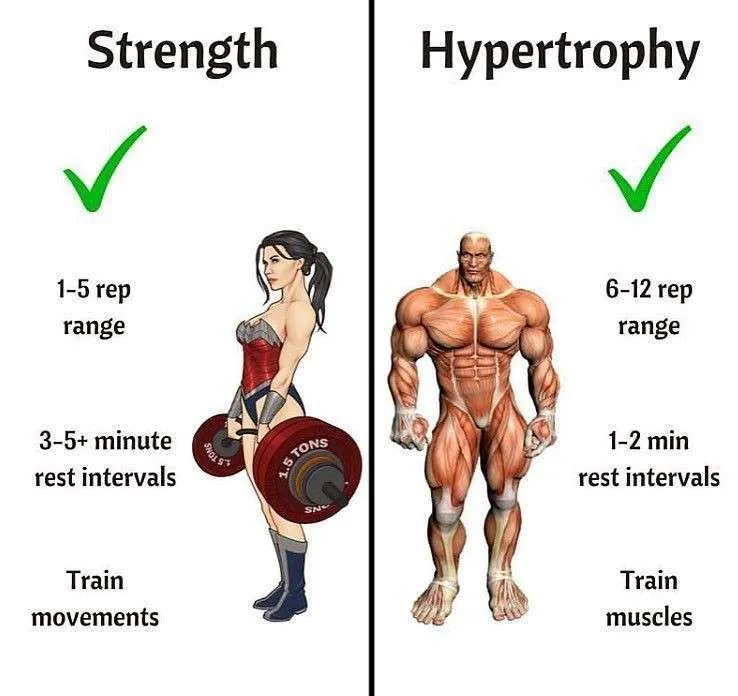Hi Friends of Oompf, its Alvan here. Today I am going to talk about Hypertrophy. You have probably heard me or your trainer or someone else throwing this term hypertrophy around sometimes. And you are wondering to yourself, “What do you mean by Hypertrophy?” Is the term even real?

Women often ask : “ Will I be big like bodybuilders?” The answer is NO, women are built differently and unless you are on some form of steroids you will not look like a man! On the contrary, if you want a nice, toned muscular body, you need to incorporate progressive overload and hypertrophy in your training.
What is Hypertrophy and how does it occur?
Hypertrophy is, by definition, the enlargement of an organ or tissue from the increase in size of its cells. When it comes to building muscle, hypertrophy doesn’t just happen like that. It has to be triggered by a physiological need. Hypertrophy can be thought of as a thickening of muscle fibres, which occurs when the body gets a right amount of stress to indicate that it must create large and stronger muscles that can tolerate this new, increased load. This need causes a certain response in your body which leads to cells synthesizing more materials.
For muscles to grow, two things have to happen: stimulation and repair. What happens is that the cells in your muscles which are rarely used become activated by trauma, damage or injury — all possible responses to the stress of weight training. Layman term, your muscle cells will break down due to micro traumas and will lead to micro tears because of weight training.
An immune system response is triggered, leading to inflammation, the natural clean up and repair process that occurs on a cellular level. This is when the repair process starts.
Concurrently, a hormonal response is triggered, causing the release of growth hormones, cortisol, and testosterone. These hormones help regulate cell activity. Growth hormone helps stimulate muscle hypertrophy while testosterone increases protein synthesis. This process leads to the muscle cells multiplying and thus in layman term: get bigger.
Factors Affecting The Rate And Efficiency Of Hypertrophy
Sleep
Rest and sleep is incredibly important to muscle growth. When you sleep, your body is hard at work repairing your muscle tissue, replacing old and damaged cells, and getting to work on the good stuff. You’ll also recharge your brain and attain more mental alertness, and it gets you ready for the next round in the gym. I would recommend at least 7-8 hours of sleep daily.
Diet
You need to focus on lean, protein-rich foods that will nourish your body and help facilitate muscle growth eg, chicken breasts, lean beef, and salmon. For veggies, stick to nuts and beans which also have protein.
Carbohydrates are super important as well for muscle building and if you have been on a weight loss diet previously and you are just trying to avoid carbohydrates altogether, you will need to get over your fear of it.
Finally, fats are essential for good health and are the building blocks for hormones (like testosterone) which you will need for muscle building. Ensure you are eating healthy fats in oily fish, avocado, olive oil, etc.
Discipline
Hitting the gym once or twice a week isn’t nearly as effective as working those muscles more often. You have to be careful you don’t over train, of course, which is where variety comes in. So for optimum gains, aim to split your days at the gym according to muscle group — but get there four to five times a week if time allows. And it does not happen magically after just a week or month of training. It has to be done over a length of time. Therefore, you have to be disciplined enough to follow this routine consistently.
Hormones
There are several hormones that affect the muscle growth. I am just going to talk about the hormone that is related to stress called cortisol. Cortisol – the primary stress hormone – directly opposes testosterone which increases muscle growth. If you are highly stressed, testosterone will lower down and so will your strength and muscle mass. Manage stress levels by eating clean, sleeping well and dealing with emotional stress to maximize testosterone levels (for men) and immune function. Doing yoga and meditating may help you if it lowers your stress.
Progressive Overload
Lastly, I have mentioned this before that an important principle for training is progressive overload. Your body adapts to its environment after a certain period of time. It gets used to the stress you are overloading your body with when it comes to weights training. Therefore, at some point of your training (if you are consistent and have been seeing improvements), you need to increase the load, volume or frequency of training to see more improvements and break plateaus.
Tell us what you think of this chat and send us your questions to [email protected]
#Weighttraining #LesMills #Dumbbell #Highintensityintervaltraining #stationarybicycle #Myfitnesspal #fitnessapp #pullup #personaltrainer

